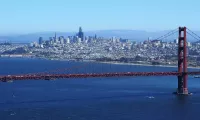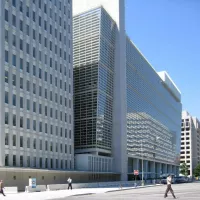Tunisia, a North African country in the Maghreb region, is bordered by Algeria, Libya, and the Mediterranean Sea, sharing maritime borders with Italy and Malta. The country is known for its ancient history, including the archaeological sites of Carthage, and its diverse geography, from the Atlas Mountains to the Sahara Desert. Tunis is the capital and largest city. The population is around 12.1 million, predominantly Arab and Muslim. While Arabic is the official language, Tunisian Arabic is widely spoken, and French is used in administrative and educational contexts. Tunisia's coastline spans 1,300 km and includes Africa's northernmost point, Cape Angela.
1906: French Colonists in Tunisia
In 1906, the number of French colonists in Tunisia grew to 34,000.
1910: Italians in Tunisia
In 1910, there were also 105,000 Italians in Tunisia.
1930: Foundation of The Rachidia
In 1930, The Rachidia was founded in Tunisia, becoming well-known for its artists from the Jewish community.
1931: Victor "Young" Perez World Champion
In 1931, Tunisian boxer Victor "Young" Perez became world champion in the flyweight weight class.
1932: Victor "Young" Perez World Champion
In 1932, Victor "Young" Perez continued as world champion in the flyweight weight class in boxing.
1934: Founding of a Musical School
In 1934, a musical school was founded in Tunisia to revive Arab Andalusian music, driven by a social and cultural revival led by the elite.
1938: Creation of Radio Tunis
The creation of Radio Tunis in 1938 provided Tunisian musicians with a greater opportunity to disseminate their works, as the station promoted Tunisian musicians exclusively.
1940: Implementation of the Statute on Jews
In 1940, the antisemitic Statute on Jews enacted by the Vichy government was implemented in Vichy-controlled Northwest Africa, including Tunisia.
November 1942: German occupation of Tunisia
In November 1942, Vichy-controlled Tunisia was occupied by Germany.
May 1943: Axis surrender
In May 1943, the Axis forces surrendered in Tunisia, marking the end of the war in Africa.
1943: Persecution and murder of Jews
From 1940 to 1943, the persecution and murder of the Jews was part of the Holocaust in France.
1945: Bourguiba arrived in Cairo
In 1945, Habib Bourguiba arrived in Cairo after escaping French surveillance and contacted the Arab League.
1945: French Colonists in Tunisia
In 1945, the number of French colonists in Tunisia grew to 144,000.
1946: Bourguiba pleads case of Tunisian nationalists
In 1946, Habib Bourguiba traveled to the United States to speak at the United Nations and with U.S. State Department officials, pleading the case of the Tunisian nationalists.
1948: Jewish Population
In 1948, the Jewish population in Tunisia was estimated at 105,000.
September 1949: Bourguiba attended AFL meeting
On September 13, 1949, Habib Bourguiba attended the American Federation of Labor meeting in San Francisco, California.
1949: Foundation of the School of Tunis
In 1949, the School of Tunis was established by a group of artists in Tunisia, including Pierre Boucherle, Yahia Turki, and Abdelaziz Gorgi, to incorporate native themes and reject Orientalist colonial painting.
November 1951: Bourguiba traveled to Italy
On November 6, 1951, Habib Bourguiba traveled to Italy and met with Alberto Mellini Ponce De León, Mario Toscano, and Licinio Vestri.
August 1953: Jean de Hautecloque leaves Tunis
On August 25, 1953, the French Resident General in Tunisia, Jean de Hautecloque left Tunis to go to Paris.
September 1953: Voizard implemented changes to ease tensions
In September 1953, Pierre Voizard arrived in Tunis and implemented many changes to ease tensions, including lifting press censorship and freeing political prisoners.
January 1954: Voizard announced new reforms
On January 26, 1954, Voizard announced that there would soon be new reforms in favor of granting more sovereignty to Tunisians.
March 1956: Tunisia achieved independence
On March 20, 1956, Tunisia achieved independence from France with Habib Bourguiba as Prime Minister.
1956: Tunisian Census
According to the 1956 Tunisian census, Tunisia had a population of 3,783,000 residents, 95% consisting of Arabs and Berbers, 256,000 Europeans and 105,000 Jews.
1956: Post-Independence Art Movement
After Tunisia's independence in 1956, the art movement was driven by nation building, with artists supported by the state. The Ministry of Culture, under figures like Habib Boularès, played a significant role in art, education, and cultural power.
1956: European Population in Tunisia
From the late 19th century to the period after World War II, Tunisia was home to large populations of French and Italians (255,000 Europeans in 1956).
1956: Tunisia gained independence
In 1956, Tunisia gained independence as the Tunisian Republic.
1956: Abolition of Sharia Courts
Sharia courts were abolished in Tunisia in 1956.
1956: Adoption of Code of Personal Status
Shortly after independence in 1956, a Code of Personal Status was adopted in Tunisia, granting women full legal status and outlawing polygamy and repudiation.
1957: Foundation of Tunisian Radio and Television
In 1957, the Tunisian Radio and Television, the predecessor to the Establishment of the Broadcasting Authority Tunisia (ERTT), was founded.
1957: Hussein dynasty lasted until 1957
The Hussein dynasty of beys, established in 1705, lasted until 1957.
May 1964: Tunisia nationalized foreign farmlands
On May 12, 1964, Tunisia nationalized foreign farmlands, leading to the cancellation of financial assistance from France.
1965: Hosted Africa's Top Basketball Event
In 1965, Tunisia hosted Africa's top basketball event, marking one of the continent's pioneer efforts in basketball.
1966: Creation of the Carthage Film Festival
In 1966, the Carthage Film Festival was created by the Tunisian Minister of Culture to showcase films from the Maghreb, Africa, and the Middle East.
1966: Start of Oil Production
Oil production began in Tunisia in 1966.
1974: Establishment of ONAS
In 1974, ONAS was established to manage the sanitation sector in Tunisia.
1977: Star Wars film franchise location
From 1977 until 2005, Tunisia was a shooting location for films of the Star Wars film franchise.
1982: PLO Based in Tunis
In 1982, Tunisia became the center of the Palestine Liberation Organization, based in the capital Tunis.
October 1985: Bombing of PLO Headquarters
On October 1, 1985, the Israeli Air Force bombed the PLO Headquarters in Tunis, killing at least 60 people.
November 1987: Ben Ali assumed the presidency
In November 1987, Prime Minister Zine El Abidine Ben Ali assumed the presidency after doctors declared Bourguiba unfit to rule.
1987: Hosted Africa's Top Basketball Event
In 1987, Tunisia hosted Africa's top basketball event, showcasing its long-standing involvement in African basketball.
1987: Newspapers and Magazines
In 1987, there were 91 newspapers and magazines in Tunisia.
1991: Compulsory Basic Education
Since 1991, basic education has been compulsory for children in Tunisia between the ages of 6 and 16.
1993: Reforms to the Code of Personal Status
Further reforms in 1993 to the Code of Personal Status included a provision allowing Tunisian women to transmit citizenship even if married to a foreigner and living abroad.
1993: ONAS Status as Main Operator
Since 1993, ONAS has had the status of a main operator for the protection of the water environment and combating pollution in Tunisia.
July 1995: Association Agreement with the EU
Tunisia was the first Mediterranean country to sign an Association Agreement with the European Union in July 1995.
1995: Student Enrollment in Higher Education
In 1995, the number of students in higher education in Tunisia was approximately 102,000, marking a starting point for significant growth in the following years.
2002: Non-School Book Publications
In 2002, Tunisia's national bibliography listed 1249 non-school books published, with 885 titles in Arabic.
2004: Tunisia Wins African Cup of Nations
In 2004, the Tunisia national football team, known as "The Eagles of Carthage", won the African Cup of Nations (ACN) as hosts.
2005: Higher Education Student Expansion
By 2005, the number of students in higher education in Tunisia had more than tripled from 1995, reaching approximately 365,000.
2005: End of Star Wars film franchise filming
From 1977 until 2005, Tunisia was a shooting location for films of the Star Wars film franchise.
2005: Handball World Championship Result
In 2005, the Tunisia men's national handball team came fourth in the Handball World Championship.
November 2006: Demerger Announcement of ERTT
On 7 November 2006, President Zine el-Abidine Ben Ali announced the demerger of the Establishment of the Broadcasting Authority Tunisia (ERTT) into two separate companies.
2006: Increase in Book Publications
In 2006, the number of non-school books published in Tunisia increased to 1,500.
2006: Oil Fields in 2006
In 2006, there were 12 oil fields in Tunisia, with the main field being El Borma.
August 2007: Effective Demerger of ERTT
On 31 August 2007, the demerger of the Establishment of the Broadcasting Authority Tunisia (ERTT) into two separate companies became effective.
2007: Tertiary Level Enrollment Rate
In 2007, Tunisia's gross enrollment rate at the tertiary level was 31 percent, with a gender parity index of 1.5.
2007: Christian Conversion Estimates
In 2007, the International Religious Freedom Report estimated that thousands of Tunisian Muslims had converted to Christianity.
2007: Continued Increase in Book Publications
In 2007, the number of non-school books published in Tunisia further increased to 1,700, with nearly a third published for children.
2007: Newspapers and Magazines Ownership
In 2007, there were approximately 245 newspapers and magazines in Tunisia, with 90% owned by private groups and independents.
2008: Military Strength in 2008
As of 2008, Tunisia had an army of 27,000 personnel equipped with 84 main battle tanks and 48 light tanks, a navy with 4,800 personnel operating 25 patrol boats and 6 other craft, and an Air Force with 154 aircraft and 4 UAVs.
2008: Oussama Mellouli Wins Gold at Summer Olympics
At the 2008 Summer Olympics, Tunisian swimmer Oussama Mellouli won a gold medal in the 1500 meter freestyle.
2008: Tunisia's Economy in 2008
In 2008, Tunisia had an economy of US$41 billion in nominal terms, and $82 billion in PPP.
2008: Tunisia's press freedom ranking
In 2008, Tunisia was ranked 143rd out of 173 in terms of press freedom.
2008: Adult Literacy Rate and Education Quality
In 2008, the total adult literacy rate in Tunisia was 78%, rising to 97.3% for individuals aged 15 to 24. In the Global Competitiveness Report 2008–09, Tunisia ranked 17th for higher education quality and 21st for primary education quality.
2008: Free Trade Area with the EU
Tunisia finalised the tariffs dismantling for industrial products in 2008 and therefore was the first non-EU Mediterranean country to enter in a free trade area with the EU.
October 2009: Ben Ali was re-elected
On 25 October 2009, Ben Ali was re-elected with a majority.
2009: Healthcare Professionals
In 2009, Tunisia had 12.02 physicians and 33.12 nurses per 10,000 inhabitants.
2009: Most Competitive Economy in Africa
Ranked the most competitive economy in Africa by the World Economic Forum in 2009, Tunisia is an export-oriented country undergoing liberalization and privatization.
December 2010: Mohamed Bouazizi set himself afire
In December 2010, Mohamed Bouazizi, a Tunisian street vendor, set himself on fire in protest.
2010: Healthcare Spending
In 2010, Tunisia's spending on healthcare represented 3.37% of the country's GDP.
2010: French Language Usage in Tunisia
In 2010, approximately 64% of the population of Tunisia, totaling 6,639,000 people, spoke French. The language is significantly used in education, business, and the press, despite lacking official status.
January 2011: Bouazizi's death led to the resignation of Ben Ali
In January 2011, Mohamed Bouazizi's death led to mass demonstrations and the resignation of President Zine El Abidine Ben Ali.
January 2011: Ben Ali fled the country
In January 2011, amid popular unrest, President Ben Ali resigned and fled the country.
January 2011: Military's Role in Domestic Security
Since January 2011, and at the direction of the executive branch, the military has taken on increasing responsibility for domestic security and humanitarian crisis response.
March 2011: Elections to Constituent Assembly
In March 2011, the interim president announced that elections to a Constituent Assembly would be held on 24 July 2011.
June 2011: Election Postponed
In June 2011, the prime minister announced the election would be postponed until 23 October 2011.
July 2011: Original date for election
In March 2011, the interim president announced that elections to a Constituent Assembly would be held on 24 July 2011.
October 2011: Constituent Assembly Election
In October 2011, elections to a Constituent Assembly were held, with the Ennahda Movement winning the most seats.
December 2011: Moncef Marzouki Elected President
In December 2011, Moncef Marzouki was elected president of Tunisia.
2011: Opening of Enfidha-Hammamet International Airport
A new airport, Enfidha – Hammamet International Airport, opened in Tunisia in 2011.
2011: Access to Safe Drinking Water
As of 2011, access to safe drinking water in Tunisia became close to universal, approaching 100% in urban areas and 90% in rural areas.
2011: The Guardian called Tunisia repressive
From independence in 1956 until the 2011 revolution, The Guardian called Tunisia "one of the most modern but repressive countries in the Arab world".
2011: Afrobasket Win
In 2011, Tunisia's national basketball team won the Afrobasket tournament.
2011: Tunisian Revolution
In 2011, the Tunisian Revolution overthrew President Zine El Abidine Ben Ali's regime.
2011: Women in Constituent Assembly
In 2011, women held between 24% and 31% of all seats in the constituent assembly.
February 2012: Growth of Political Parties
As of February 2012, the number of legalized political parties in Tunisia had grown considerably since the revolution, with over 100 legal parties, including some that existed under the former regime. During Ben Ali's rule, only three functioned as independent opposition parties: the PDP, FDTL, and Tajdid.
March 2012: Ennahda Supports Secular Nature of State
In March 2012, Ennahda declared it will not support making sharia the main source of legislation in the new constitution, maintaining the secular nature of the state.
2012: Oussama Mellouli Wins Medals at Summer Olympics
At the 2012 Summer Olympics, Oussama Mellouli won a bronze medal in the 1500 meter freestyle and a gold medal in the men's marathon swim at a distance of 10 kilometers.
2012: Summer Paralympic Games
In 2012, Tunisia participated in the Summer Paralympic Games, securing 19 medals: 9 golds, 5 silvers, and 5 bronzes, and was classified 14th overall and 5th in Athletics.
2012: Lowest Non-Revenue Water Rate
In 2012, the rate of non-revenue water in Tunisia was the lowest in the region at 21%.
February 2013: Assassination of Chokri Belaid
On 6 February 2013, Chokri Belaid, the leader of the leftist opposition and prominent critic of Ennahda, was assassinated.
2013: Jewish Population Remained
By 2013, only about 1000 Jews remained in Tunisia.
2013: Increase in Non-Religious Identification
In 2013, approximately 12% of Tunisians identified as non-religious, according to surveys at the time. This marked a significant point in the changing religious landscape of Tunisia.
January 2014: Adoption of the Constitution of Tunisia
On 26 January 2014, the Constitution of Tunisia was adopted, guaranteeing rights for women and specifying that the President's religion "shall be Islam".
October 2014: Parliamentary Elections
In October 2014, Tunisia held free multiparty parliamentary elections.
October 2014: First Elections Under New Constitution
In October 2014, Tunisia held its first elections under the new constitution, following the Arab Spring.
November 2014: Presidential Elections
In November 2014, Tunisia held presidential elections.
November 2014: First Presidential Election After Arab Spring
On 23 November 2014, Tunisia held its first presidential election following the Arab Spring in 2011.
2014: Establishment of Truth and Dignity Commission
In 2014, President Moncef Marzouki established Tunisia's Truth and Dignity Commission.
October 2015: Tunisian Solar Plan
According to the Tunisian Solar Plan, as of October 2015, Tunisia's objective is to reach a share of 30% of renewable energies in the electricity mix by 2030.
2015: Abandonment of Nuclear Power Plans
As of 2015, Tunisia had abandoned plans for nuclear power stations and was considering other options to diversify its energy mix.
2015: Hosted Africa's Top Basketball Event
In 2015, Tunisia hosted Africa's top basketball event, continuing its tradition as a key location for basketball in Africa.
2015: Terror attacks
In 2015, Tunisia was hit by two terror attacks on foreign tourists and the Tunisian National Dialogue Quartet won the 2015 Nobel Peace Prize.
2016: Least Corrupt North African Country
According to the Corruption Perceptions Index published by Transparency International, Tunisia was ranked the least corrupt North African country in 2016, with a score of 41.
2016: Life Expectancy
In 2016, the average life expectancy at birth in Tunisia was 75.73 years: 73.72 years for males and 77.78 years for females.
2018: Religious Identification in Tunisia
In 2018, a survey indicated that the vast majority (99.4%) of Tunisians identified as Muslim, while over a third identified as non-religious. This marked a notable increase from 2013, positioning Tunisia as the least religious country in the Arab world at that time.
2018: African Cup Victory
In 2018, the Tunisian national handball team won the African Cup in Gabon by defeating Egypt.
July 2019: Death of President Essebsi
In July 2019, Tunisia's first democratically elected president Beji Caid Essebsi died.
October 2019: Saied became president
In October 2019, Kais Saied became Tunisia's president after a victory in the presidential elections.
2020: Decline in Electoral Democracy Index
Between 2020 and 2022, the V-Dem Democracy indices score for electoral democracy in Tunisia dropped from 0.727 to 0.307.
2020: Considered a democratic state
From 2014 to 2020, Tunisia was considered the only democratic state in the Arab world.
2020: Planned Nuclear Power Stations
Tunisia had plans for two nuclear power stations, to be operational by 2020, with each facility projected to produce 900–1000 MW.
July 2021: Saied Suspended Parliament
On July 25, 2021, amid demonstrations, Kais Saied suspended parliament and dismissed the prime minister.
September 2021: Saied Announces New Constitutional Amendments
In September 2021, Saied said he would appoint a committee to help draft new constitutional amendments.
2021: Tunisia Population
According to the CIA, as of 2021, Tunisia had a population of 11,811,335 inhabitants.
2021: Rise of Tennis Popularity
Beginning in 2021, tennis saw increased popularity in Tunisia due to Ons Jabeur's rise in rankings.
2021: Religious Identification Survey Results
In 2021, an Arab Barometer survey indicated that 44% of Tunisians considered themselves religious, 37% somewhat religious, and 19% non-religious.
2021: End of Democracy in North Africa
Until 2021, Tunisia was the only democracy in North Africa. After a democratic backsliding, the country is now classified as a "hybrid regime" in the Democracy Index (The Economist).
February 2022: Tunisia and IMF Negotiations
In February 2022, Tunisia and the International Monetary Fund (IMF) engaged in preliminary talks, aiming to secure a multibillion-dollar bailout to address the country's economic challenges, including recession, public debt, inflation, and unemployment.
February 2022: Tunisia Voted to AU Peace and Security Council
On 3 February 2022, Tunisia was voted to the African Union's (AU) Peace and Security Council for the term 2022–2024.
May 2022: Decree for Constitutional Change
On 25 May 2022, President Kais Saied issued a decree for change of constitution by 25 July.
July 2022: Reversal of Non-Religious Trend
As of July 2022, BBC's The Newsroom reported that the prior trend of Tunisians identifying as non-religious had reversed, based on new surveys by the Arab Barometer.
September 2022: Decree Law 54 on False Information
In September 2022, Tunisian president Kais Saied signed Decree Law 54 to combat "false information and rumours" on the Internet, imposing imprisonment and fines for spreading such information.
2022: Constitutional Referendum and Shift to Presidential Republic
Following the 2022 constitutional referendum, Tunisia transitioned into a unitary presidential republic.
2022: Power Production Output
In 2022, Tunisia produced 19,520 GWh.
April 2023: Government Closes Ennahda Headquarters and Arrests Leader
In April 2023, the Tunisian government shut down the headquarters of the Ennahda party and arrested its leader, Rached Ghannouchi.
June 2023: World Bank Group Loan for ELMED Project
In June 2023, the World Bank Group lent Tunisia $268.4 million to finance ELMED, an electrical interconnection project with Italy.
September 2023: Saied Postpones EU Delegation Visit
In September 2023, President Saied requested the postponement of a visit by a delegation from the EU commission to discuss migration, according to Minister of the Interior Kamel Feki. Human rights organizations also criticized the July migration agreement.
October 2023: Abir Moussi Detained
In October 2023, Abir Moussi, the head of the Free Destourian Party (FDL), was detained or imprisoned, becoming the latest prominent opponent of President Saied to face such action.
October 2023: Saied Turns Down EU Aid
In October 2023, President Saied rejected 127 million in EU aid, deeming the amount insufficient in relation to a deal signed three months prior, which caused surprise in Brussels.
2023: Tennis Popularity and Ons Jabeur's Success
In 2023, tennis remained highly popular in Tunisia, with Ons Jabeur achieving a career high ranking of number 3 and reaching multiple Grand Slam finals.
September 2024: Crude Oil Production Rate
At the end of September 2024, the production rate of crude oil in Tunisia was 29,200 barrels per day (4,640 m3/d).
October 2024: President Saied Wins Second Term
On 6 October 2024, President Kais Saied secured a second term with over 90% of the vote in a presidential election marked by a low turnout of 28.8%. Five political parties had urged citizens to boycott the elections.
2024: Global Peace Index Ranking
According to the 2024 Global Peace Index, Tunisia is the 73rd most peaceful country in the world.
2024: Power Production Capacity
As of 2024, Tunisia's current power production capacity is estimated at 5,944 MW installed in 25 power plants.
2024: Term on the African Union's Peace and Security Council
On 3 February 2022, Tunisia was voted to the African Union's (AU) Peace and Security Council for the term 2022–2024.
April 2025: Dismantling of Migrant Camps
In April 2025, Tunisia dismantled dozens of makeshift camps housing African migrants, displacing as many as 7,000 people.
2025: Hybrid regime under single person rule
As of 2025, Tunisia no longer has free elections and is under the single person rule of Saïed.
2030: Renewable Energy Target
According to the Tunisian Solar Plan, Tunisia aims to reach a share of 30% of renewable energies in the electricity mix by 2030.
Mentioned in this timeline

Basketball is a team sport played on a rectangular court...
California is a U S state on the Pacific Coast...

San Francisco is a major commercial financial and cultural hub...
Germany officially the Federal Republic of Germany is a nation...
Africa is the second-largest and second-most populous continent comprising of...

The World Bank is an international financial institution offering loans...
Trending

43 minutes ago Blair Underwood Discusses Fame, Staying True, and Almost Passing on 'Set It Off'

43 minutes ago Zach Braff reflects on Scrubs' return and auditioning six times 25 years ago.

44 minutes ago Embiid Probable, Powell's Status Uncertain for Sixers-Heat Game: Injury Report Details
44 minutes ago Ghosts Season 5 Premieres: New Spirits and More Laughs on Paramount+

45 minutes ago Desmond Bane, Anthony Edwards Fined $25K by NBA for Throwing Balls

2 hours ago Kim Mulkey's LSU Tigers: NCAA Tournament Seeding Possibilities and AP Poll Ranking
Popular

Jesse Jackson is an American civil rights activist politician and...

Susan Rice is an American diplomat and public official prominent...

Barack Obama the th U S President - was the...

XXXTentacion born Jahseh Dwayne Ricardo Onfroy was a controversial yet...

Michael Joseph Jackson the King of Pop was a highly...

Kashyap Pramod Patel is an American lawyer who became the...